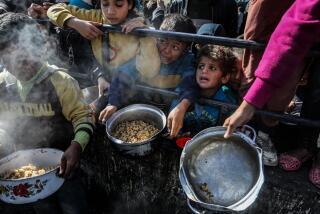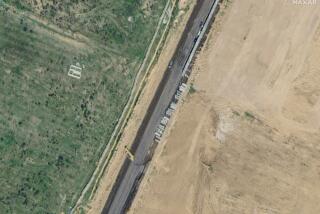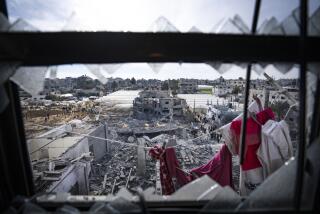In a divided Egypt, fights break out even in hospital hallways
CAIRO — Each family had come to comfort its loved ones, bloodied in street fighting the night before, but the emotional scars ripped open again Saturday in the crowded white corridors of Kasr El Aini Hospital.
“What you are doing is haram,” or forbidden by Islam, one man yelled at another whose bushy beard marked him as a supporter of Egypt’s deposed Islamist president, Mohamed Morsi.
What do you know about Islam, the bearded man scoffed at his accuser, a Morsi opponent. Instantly, hospital workers said, men in both families drew knives as their wounded relatives lay only a few feet away. The only ones injured, slightly, were security guards who rushed in to prevent a melee.
“This trouble is going to continue. It won’t finish easily,” said Mohammed Sultan, a 44-year-old nurse at the sprawling hospital along the Nile, which treated dozens of people injured in an overnight battle between the pro- and anti-Morsi camps outside nearby Cairo University.
“There are Islamic extremists on one side who say they are fighting for their president and their religion,” Sultan said. “The other side … says they are defending their freedom.”
Since Morsi was brought down in a military coup, Egypt has become a land divided by a crackdown on the Muslim Brotherhood and worry — just days before the beginning of the holy month of Ramadan — that violence will escalate.
Scenes of conflict are all too familiar. Barricades, scorched streets, shattered glass, bodies pulled from gunfire and smoke. The deepening rifts between opposing demonstrators have undone the seams of a nation already fragile after two years of unrest. Political and religious enmity has resulted in two seething factions, each believing it represents the destiny of the Arab world’s most populous nation.
The clashes between Islamists, most of whom back the Muslim Brotherhood, and the largely secular forces that supported the coup led by Gen. Abdel Fattah Sisi have left dozens dead. And they have demarcated Cairo, Alexandria and other cities into rival camps fueled by conspiracy theories and armed with sticks, guns, knives, slingshots and shields of corrugated metal.
“Sisi committed the biggest mistake in history. He divided the Egyptian people,” said Wahid Galal, a factory supervisor sitting in the shade and reading a Koran with hundreds of other Morsi supporters just outside the campus of Cairo University.
“The Islamists have come together as one hand,” he said. “This is a war not just against the Brotherhood but against Islam.”
The road leading to the university is littered with stones and tree limbs. Men patrol with clubs while boys with hammered wooden shields, photos of Morsi dangling from their necks, stand with their elders at barricades in the heat. They are waiting for an attack. A sniper, they said, shot at them from a building the other night.
“There,” they pointed.
When it’s dark, the attackers come, they said.
Galal has been camped here for four days. His Koran stained with sweat, he sleeps beneath a sheet tied to two trees. Women bring tea and a cleric with a microphone tells him and the others to remember how the prophet Muhammad suffered indignities but persevered. One man lifts a copy of a lawsuit Islamists have filed seeking to reinstate Morsi as president.
“I won’t leave until President Morsi returns to the presidency,” said Galal.
“We’ll be here until we die,” echoed his friend, Abdel Taleb Shobaky. “We came here carrying our coffins. Either legitimacy returns or we die. The legitimacy of the presidency is the balancing act. Without it, no Egyptian can be happy.”
The men blame Christians, the United States, Israel, anarchists and other Muslims for plotting against them. A few men sweep the litter from a barricade that leads to the Gamma Bridge over the Nile, where, several hundred yards away, mourners gathered at the Salah al Din mosque.
This crowd told a different story.
“Five people died here last night,” said Gamal Kandil, pointing toward the bridge aglitter with glass, speckled with stones and broken bricks. “The Muslim Brotherhood does not have mercy. When they come we protect our women. They have snipers in that high building,” he said, pointing to the same building singled out by the boys with shields on the other side of the bridge.
“The fighting lasted from 3 a.m. until 6 a.m.,” Kandil said. “We don’t know what the Muslim Brotherhood is planning.”
Sultan, the nurse, said he heard gunshots from the bridge as he punched in to start his shift at 6 a.m. The injured streamed through the hospital gates, many of them ferried on motorbikes by red-eyed combatants.
Hospital workers tried to keep the two sides apart but tempers flared, with one man punching a basketball-sized hole in the emergency room’s plywood reception desk.
Mohamed Baradey, a doctor working in the ER, tweeted that the hospital corridors had “witnessed a taste of sectarian clashes.” Hospital staff members hid bearded interns from anti-Morsi arrivals, and, similarly for safety, shaved one Morsi supporter who had been admitted with an eye injury, he said.
By Friday afternoon, calm had been restored outside the mosque. Police in white uniforms lingered around a blue truck. Women in black abayas gathered at the mosque’s gate. One wept behind her sunglasses. A man in a suit stood near a boy who kept his head down. Shops were open but their keepers appeared wary; fighting can ensue as swiftly as a storm.
Yet between the divisions, life goes on along the Nile.
Kandil, a slim man with a cigarette, offered a bit of arithmetic.
“The Muslim Brotherhood has 5 million supporters,” Kandil said, perhaps subtracting a little from the Islamists’ side of the equation. “But the people against Morsi and the Brotherhood are 40 million, 30 million of whom are young. We’ll clean them out.”
Mohamed Tir agreed. He glanced toward the mourners, then toward the bridge.
“Egyptians are Muslims and Christians. We are very easy people,” he said. “But the Brotherhood people are different. They’re radical and they want to affect us, but we won’t let them.”
A police officer with stars on his epaulets walked past. Tir wished it would all be over.
“If the Brotherhood stops this violence, we won’t exclude them,” he said. “We’ll bring them back into our lives.”
More to Read
Start your day right
Sign up for Essential California for news, features and recommendations from the L.A. Times and beyond in your inbox six days a week.
You may occasionally receive promotional content from the Los Angeles Times.








